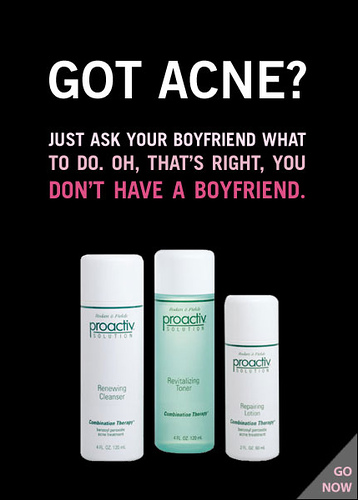Chapter 5 talks about accepting and rejecting claims, also when to accept or reject claims. It is either by your personal experience or other useful sources, such as the media, journal or someone you trust that is really reliable. There is a lot of false advertisement on the Internet nowadays because technology is becoming better and everyone knows how to use ads. I found three types of advertisement on the web and I wouldn’t choose so I posted these three pictures up. These pictures are an ad of Proactiv Solution, which is some type of cream to help people get rid of acnes or pimples. I never tried this, but my friends have and they have told me that it works. Now their skins are a little clearer than before. But I also have friends that told me that it does not work. So in order for me to know if it works or not, I have to try it myself. That is what I did. I had 1 zit on my face a week before prom and I wanted to get rid of it quick. My friends suggested proactiv and I tried it. It did not work. :( To accept a claim or reject a claim, our most reliable resources are ourselves. I can trust my friends, but half of my friends said it worked for them and the others said it does not. Proactiv solution is using celebrities to false advertise their company to get more customers. Just because celebrities use the products, doesn’t mean that you should use it so you can clear up the acne. This product works on different types of skin, and if your skin is the type that it doesn’t work on, then the ad was false because you didn’t get the skin like the Justin Bieber or Jessica Simpson. The last add is aiming it at girls to use this product in order for them to get a boyfriend. This is a false advertisement. We should reject this ad because we know the claim contradicts other claims that we know to be true.


I thought the first ad on top was really sad, but funny! ProActiv is better off known with their marketing ploy for celebrity endorsements. You don't know how many celebrities they have appeared to sponsor their products. How are we so sure that these celebrities uses these products? They're probably just so famously known and many people would automatically think that they use it, it works, because these celebrities have perfect skin themselves! ProActiv just varies like I mentioned in my blog because as far as I know, it's a 50/50 on the results from the people that I know. It either works for their skin or it doesn't. Their advertisement makes it seems like it works for every skin when it's not always true because everyone has a different skin type. Nice work on the blog post!
ReplyDeleteI was shocked when I saw your first advertisement! It’s funny in a certain sense, and definitely makes a lasting impression! I agree with what you spoke about in the middle of your post, that ProActive does not work on all skin types and that it is unfair to display this kind of advertisement when it is not guaranteed for everyone. I know I’ve personally tried ProActive and it did not work well on my skin, despite the incredible amount of advertisement this company does. ProActive is infamous for using well known celebrities to promote their product, despite the rumor that half of those celebrities don’t use it.
ReplyDeleteI love the way you use the above example, and you also share your personal experience which make the post much clearer and easier to understand. You have great explanation on personal experience's importance in the argument analysis process. Yes! after reading chapter 4 and 5, I have to agree that advertisements are just another form of argument. The advertisers just use fancier images, graphs, methods, ect. to support their claims or arguments. In the end, arguments and advertisements just have one purpose: to make the customers or audience believe in what they try to say. There are weak and strong arguments just like false and successful advertisements.
ReplyDelete